|

Autumn 2001 (9.3)
Pages
68-73
A Home for Inara
At Last
- Azerbaijan's First Adoption
by Kimi
Abernathy
Other articles related
to Azerbaijan Adoptions and Orphanages in Azerbaijan
A
Home for Inara - Azerbaijan's
First Adoption
Guidelines - Adopting a
Child from Azerbaijan
AzerbaijanAdopt
ListServ
British
Airways Adopts Orphanage
Saving the Children: Mobil Undertakes
Orphanage
Project
Children's
Games Build Bridges: International Women's Club Reaches Out
Third
Annual Reunion of Adopted Children from Azerbaijan
Adoptions
- Celebrating our families.
  When Kimi and Bill Abernathy
set out to adopt an Azerbaijani child, they had no idea how difficult
and heart-rending the process would be. After three years of
crushed hopes and numerous delays, they finally brought home
their daughter, Inara, last summer. Theirs was the first international
adoption to go through in Azerbaijan. Since then, approximately
15 more Azerbaijani children have been adopted. When Kimi and Bill Abernathy
set out to adopt an Azerbaijani child, they had no idea how difficult
and heart-rending the process would be. After three years of
crushed hopes and numerous delays, they finally brought home
their daughter, Inara, last summer. Theirs was the first international
adoption to go through in Azerbaijan. Since then, approximately
15 more Azerbaijani children have been adopted.
Many of Azerbaijan's orphanages are filled with children, and
there simply isn't enough money available to care for all of
their needs. The Azerbaijani government is still learning how
to handle the process of adoption, as its laws and procedures
were only recently established. Yet, there seems to be hope for
some of the Azerbaijani orphans who need homes and for foreign
parents who would like to provide them. It takes a lot of patience
to make it work, however.
Just like my own experience of
growing up outside my native land, Inara will be caught between
two cultures. It's our job as her parents to equip her with as
much knowledge as possible about the land of her birth.
Red Threads
The Chinese call them "red threads", the invisible
lines present at birth that pull us slowly to the people we are
to love. They believe that although a thread may stretch or tangle,
it will never break. Over and over again in life, individuals
find themselves in exactly the right place at the time they need
to be there -
not before, not after, just at the right moment.
When my husband Bill and I first started to pursue adoption in
Azerbaijan in 1997, we were apparently three years too early.
I first heard about "red threads" from a Russian adoption
listserv that I had joined when we were trying to adopt a child.
That listserv was, it seems, one of the red threads that pulled
us down a rather strange and convoluted path to Baku. Another
"red thread" was the magazine Azerbaijan International.
It took three years and the assistance of many good people for
us to find ourselves in the right place at the right time.
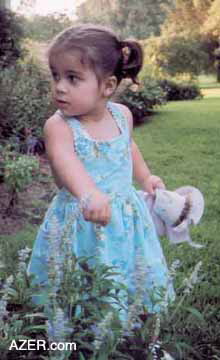  Left: Inara in her new home in Tennessee;
she was adopted last year from a Baku orphanage. Left: Inara in her new home in Tennessee;
she was adopted last year from a Baku orphanage.
I'm
an American of Azerbaijani descent; my mother is from southwest
Virginia, my father from Tabriz (Azerbaijani region of Iran)
with ancestors from Ordubadi (the Nakhchivan region of Azerbaijan).
My husband is an American of Scottish heritage. We have four
wonderful biological sons who are the light of our lives, Lane
(18), Drew (15), Charlie (15) and Harris (13), but we also wanted
a daughter of Middle Eastern descent - one with dark brown eyes and thick
black hair. One of our younger boys said that we needed someone
else in our family. We were not complete.
Looking for Leads
In 1997, when we decided to adopt, we felt drawn to Azerbaijan.
We wanted to help a child who needed a family, but more than
that, we wanted a daughter we could love. We thought Azerbaijan
might have both.
We began our search on the Internet by searching for the terms
"Azerbaijan" and "orphan". We found three
references, all on Azerbaijan International's Web site (AZER.com).
The first was an article describing Mobil's refurbishing of the
Lokbatan Orphanage.
The second article highlighted Baku's International Women's Club,
which had "adopted" several orphanages, providing regular
volunteers and aid. The third article listed major international
humanitarian organizations working on issues related to children
in Azerbaijan.
I sent queries to all of the non-governmental organizations that
were listed. I e-mailed the U.S. Embassy in Baku and the Azerbaijani
Embassy in Washington, D.C. I contacted Azerbaijan International
magazine and the oil companies with offices in Baku. I wrote
Azerbaijan's President, Heydar Aliyev: "I'm an American
citizen of Azerbaijani descent. My husband and I want to adopt
an Azerbaijani child in need of a family. Can we adopt a child
in Azerbaijan? If so, who should we contact?"
Not everyone responded; those who did were extraordinarily helpful,
full of good wishes but not overly optimistic. Sadly, they all
replied that this type of adoption had not been done before.
Azerbaijan was dealing with the political and economic trials
of its newly regained independence and the agony of the war in
Nagorno-Karabakh, and therefore had no adoption laws in place,
nor were any expected to be passed in the near future.
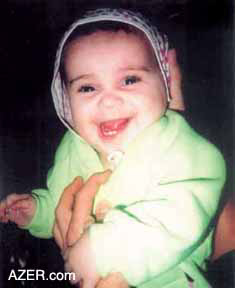  Through UMCOR (United
Methodist Committee on Relief) in Tbilisi, Georgia, I learned
of Aysel, a beautiful Azerbaijani baby girl. We spent nearly
a year trying to adopt her. Through UMCOR (United
Methodist Committee on Relief) in Tbilisi, Georgia, I learned
of Aysel, a beautiful Azerbaijani baby girl. We spent nearly
a year trying to adopt her.
While it is technically legal to adopt in Georgia, some of the
womens' organizations were highly opposed to international adoption.
Since Aysel was Azerbaijani and had a heart condition, we hoped
that her adoption would prove an exception.
Left: Margaret Inara Abernathy,
the first international adoption in Azerbaijan. Documentation
was completed on May 20, 2000.
On October 5, 1998, however, we received the news: our adoption
request had been denied. It was devastating news, especially
for our boys. I will never forget the look on their faces when
we told them that we would not be bringing Aysel home.
The Search Continues
In January 1999, while on a business trip and sitting alone in
my hotel room, I happened upon a television program featuring
Thomas Goltz's book "Azerbaijan Diary", describing
Nagorno-Karabakh and the early days of independence. Well aware
of the issues in the region, once again I felt compelled to find
out how we could help Azerbaijani orphans, even if we were unable
to adopt any. Amazingly, when I arrived home I received an e-mail
from our adoption agency asking if we were interested in adopting
in Azerbaijan as a test family. We thought the time might be
right.
To our knowledge, no other foreign family had ever succeeded
in adopting an Azerbaijani child. We were told that the Azerbaijani
government was working on international adoption laws and expected
them to be in place within a few months, but nothing was certain.
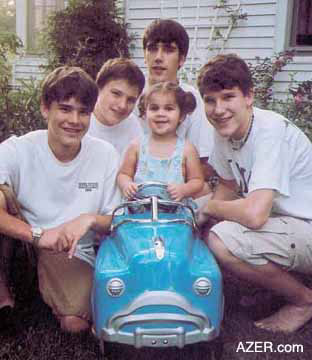  Left: Margaret Inara Abernathy (2) at home
in Tennessee with her four new brothers: (from left to right)
Drew (15), Harris ( 13), Lane (18) and Charlie ( 15). Their mom
Kimi Abernathy says, "The boys love their new sister and
critique all baby sitters, her clothes, how her parents are raising
her and everything else. Not a day goes by without them hugging
her, kissing her and telling her how pretty she is and that they
love her. They are going to be great daddys and thier wives and
children will have Inara to thank for it." Left: Margaret Inara Abernathy (2) at home
in Tennessee with her four new brothers: (from left to right)
Drew (15), Harris ( 13), Lane (18) and Charlie ( 15). Their mom
Kimi Abernathy says, "The boys love their new sister and
critique all baby sitters, her clothes, how her parents are raising
her and everything else. Not a day goes by without them hugging
her, kissing her and telling her how pretty she is and that they
love her. They are going to be great daddys and thier wives and
children will have Inara to thank for it."
Once
again, I sent out a flurry of e-mails. The Vice Consul of the
U.S. Embassy in Baku, Crystal Erwin, replied that adoption was
still a "no-go" as far as she knew, but she would check
into it. Over the next few months, she monitored the status of
adoption laws, eventually finding out that things were, indeed,
in place and that our attorney, Ali, was in fact a legitimate
and reliable contact.
We gathered the documents for our dossier, including our marriage
license, birth certificates, letters of employment, letters to
the adoption committee, medical forms and powers of attorney.
We had everything translated into Azeri and legalized. But it
didn't take long for us to discover that while the laws were
in place, the procedures were not. The Ministers who were supposed
to review our dossier and approve us for adoption did not meet
on a regular basis, and thus our attorney had to hand-carry all
the documents from office to office.
We waited and waited for word from Baku. "Has the committee
met?" became our nagging question. "Not yet, maybe
next week." Finally the word came: "Yes, you have been
approved for adoption."
A referral video, a couple of photographs and medical reports
on several of the children arrived in the mail. The video showed
a party at an orphanage. The children were happily playing games,
performing songs and traditional dances and enjoying the festivities.
It was lovely.
We watched the tape, eagerly looking at every face. "Is
that her? Is she our daughter?" The video was blurry, but
we were transfixed, crowding around the TV screen as if we were
watching a miracle. We saw sweet children of all ages-girls and
boys with beautiful brown eyes and spontaneous smiles.
At last we saw her, a solemn baby. It's amazing that compared
to all of the happy, smiling children, it was the child with
the serious face and bright eyes that captivated our hearts.
The orphanage director, Irada khanim, was juggling a ball that
jingled and trying to cajole a smile out of her. She kissed the
child and tickled her, but to no avail.
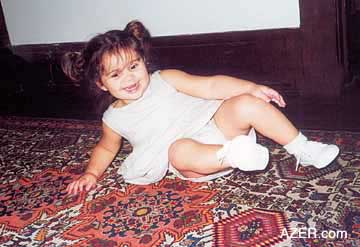  This was the baby we
wanted. We watched this tiny girl look at everyone around her.
She was a careful observer, and when she was satisfied with everything
she saw, she started laughing. Her eyes glittered with intelligence
and curiosity. When we accepted the referral for this child,
whose name was Umnissa, we learned that she had been born the
exact day that we had learned of our rejection to adopt Aysel
- October 5, 1998. This was the baby we
wanted. We watched this tiny girl look at everyone around her.
She was a careful observer, and when she was satisfied with everything
she saw, she started laughing. Her eyes glittered with intelligence
and curiosity. When we accepted the referral for this child,
whose name was Umnissa, we learned that she had been born the
exact day that we had learned of our rejection to adopt Aysel
- October 5, 1998.
A Long Wait
Then the true and painful waiting began. With a specific child
in mind, it was more difficult to wait patiently for the bureaucrats
to meet and finalize the adoption. As we waited, we gathered
donations of clothing, toys and medicine to take to the other
children in the orphanage. We watched Umnissa's video over and
over again and fell more and more in love with her. We tried
to deal with the roller coaster of emotions - one day full of hope, the next full
of frustration. Once again, that same question plagued us: "Has
the committee met?" "Not yet, maybe next week,"
came the reply week after week.
Summer came and went. We set our sights on Umnissa's first birthday.
We hoped that she would be "home" by then. We learned
that some of the members of the International Women's Club were
volunteering at Umnissa's Baby House. It meant so much to us
to know that they were there, holding her, loving her, nurturing
her.
But Umnissa's birthday came and went. We celebrated with a cake,
putting a piece in the freezer for her. When we learned that
we would probably be traveling to Baku in December, we began
to get excited. With a tentative travel schedule, it seemed like
our dream was finally going to turn into reality.
One afternoon in November I had come home from the office early
when Bill called with news. It was the call we were so desperately
waiting for. But the news wasn't what we had expected: "Umnissa
died in October. They believe she had an aneurysm." What
could I say? I was in shock. Bill was in shock. We were in such
pain. It was as if Umnissa had already been with us in our home,
living with us all those months.
Our oldest son, Lane, arrived home soon after we received the
call. He saw my face and asked what was wrong. I told him that
Umnissa had died. Lane collapsed to the floor in tears. It was
painful to watch. We told the other boys that night and held
them as they all cried.
Giving Up Hope
We no longer pursued any adoption plans. We couldn't do this
to the boys again. We held a memorial service for Umnissa, and
family and friends who knew what she had meant to us attended.
Ali, our attorney, and Tatiana, our facilitator, were almost
as devastated as we were. They understood how much we had come
to love Umnissa as a daughter. In December, we received a call
from the agency saying that things were working out in Georgia,
would we consider another try? No, we decided we could not. The
agency called again after Christmas and asked if we would consider
another adoption in Azerbaijan. At that point, we were the only
family that had been approved. It would take a good deal of time
to get another family in place to inaugurate the program. We
gave it serious thought, but again we decided it was not right
for our family. We told them, "Not now." The agency
understood, but they decided to send us referral videos anyway.
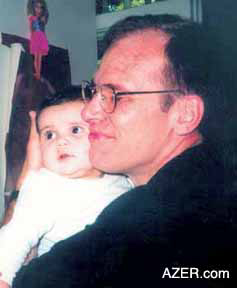  Left: Inara as a newly adopted baby with proud
father Bill Abernathy. Left: Inara as a newly adopted baby with proud
father Bill Abernathy.
Over
the holidays we received a video with five referrals on it. We
said "No" without even looking at it. After New Year's,
we received another video. Again, we refused. Again, we refused
to look.
A Life-Changing
Video
In February 2000, a third video arrived. For some reason, I decided
to look at it and then showed it to my husband. There were two
little girls on the tape. One of them instantly caught our attention.
She was the less alert of the two, but at one point in the video,
something off-camera caught her eye. She raised one tiny eyebrow
just a fraction, and the smallest hint of a smile glowed in her
eyes, though not on her lips. The look was so quick that I had
to rewind the tape to see if it had really happened. Something
about that expression captivated us. With her beautiful eyebrows,
we found her to be more expressive than most people are with
words. Inara was her name. From her medical history, we learned
that she had entered the orphanage the same week in November
that we had learned of Umnissa's death.
But we could not endure another struggle. Our social worker said,
"Why don't you set a deadline by which this must be accomplished,
and if we can, we'll do it." April 15th was our deadline.
We sent several new documents for translation and legalization.
This time, we didn't tell the boys or our families. We had to
renew our INS [Immigration and Naturalization Service] clearance,
as it had expired the previous December. We tried to remain distanced
and business-like about the whole process.
In March, we heard that there were still no provisions for issuing
passports to minors. In addition, it seems the Adoption Committee
wanted to approve at least three adoptions together rather than
just one. There were two other families who were nearly ready.
We would have to wait for the Committee to approve those families
and for referrals to be made and accepted before they would meet
to finalize the adoptions.
April 15th came and went. No word. We pushed our firm deadline
forward another month to May 15th. This time I told the agency,
"If this doesn't happen by May 15th, don't call, don't e-mail,
don't write. I never want to hear from you again." We were
frightened by the prospect of another loss.
Finally, we told our parents and the boys. I was tired of dealing
with the agency. Via my father, who speaks Azeri, we began communicating
directly with Ali, our attorney in Baku. This made an enormous
difference. Ali was cautious but hopeful. My father asked him
all of our questions. Ali responded fairly and with care. He
told us about Inara and said that she was a beautiful, sweet
child. At one point, my father asked if there was a holdup in
the process because we were not offering any "incentives".
Ali became offended, replying, "Absolutely not. Never suggest
that again."
My father was satisfied that we were dealing with an honest and
caring man. The two of them spoke several times throughout April
and May. As they talked, my father's respect for Ali grew. Time,
however, was running out. We started making preparations by getting
visa applications and reserving tickets. May 15th came and we
began to lose hope. We had to cancel another set of plane reservations.
On May 16th we decided we were not meant to have a daughter.
We would be happy and satisfied with our four boys. After all,
they were four more blessings than most people had. My husband
was scheduled to be away on business for two weeks, and I was
in my busiest season at work, staying at the office until late.
We made arrangements for the boys to have a full summer of fun.
We tried to act normal, but inside we mourned.
On May 27th Bill drove to New Jersey on a trip related to his
work. Two days later, the adoption agency e-mailed us to say
that Inara was legally our daughter. What? The committee had
met on May 20th. Bless them! Our agency had wanted to confirm
everything with the U.S. Embassy before contacting us. The final
adoption decree had been signed May 20th. Now I was really shell-shocked.
We had just 30 days to pick up Inara, and 10 of those days had
already passed! My husband had just left for two weeks. What
a surprise!
Things moved quickly. While Bill drove back home to Tennessee,
the boys and I packed, organized donations and took phone calls
from friends who admitted they thought this day would never come.
We were working on sheer adrenaline and giddy energy. Bill pulled
in early the morning of the 11th, exhausted and unsure of what
we had planned for him. We were caught getting a last-minute
visa. Russian Independence Day meant that the consulates would
be closed, so our couriered documents would not arrive on time.
We would have to fly out a day early to pick up a same-day visa
from the Russian consulate in New York [At the time of the Abernathy
adoption, the U.S. Embassy required visa processing for adoptees
via Moscow]. Bill was barely home for 24 hours before we were
on our way.
Trip to Baku
On June 16th, a lovely young woman greeted us with a bouquet
of flowers at the Baku airport. She stood beside a distinguished
gentleman with a kind face. It was our friend Ali. We finally
met the man who had worked on our behalf for more than two years.
The young woman was his daughter Zarina, who served as our translator
during our stay.
Back at Ali's apartment, Ali and his family showered us with
Azerbaijani hospitality. Mehriban, his wife, prepared tea and
set a lavish table of fresh fruits and sweets. She offered apricots
from Ordubadi as a special gift. We spent the evening getting
to know one another. Did we know that Ali had a brother-in-law
from Tabriz? How was Reza bey (my father)? Were the boys staying
with him and Margaret khanim (my mother)? More tea?
I felt like I was in the home of a beloved aunt, a respected
uncle and a dear cousin. We had known of each other for so long.
Yet, I had never really envisioned being with them or even believed
that this day would finally come. Even the scents and sounds
of the apartment reminded me of my grandmother's home in Tehran.
The look, energy and feel of Baku reminded me of the time I had
spent as a child visiting my father's relatives in Iran. These
people quickly felt like family - lifelong friends.
Ali was much more than a kind host - he was the lifeline to our daughter.
On June 17th we drove to Baby House No. 1. Bill and I were both
excited and anxious. I tried to drink in everything that I saw
on the drive to the orphanage. We passed through streets that
were more crowded than anything I had ever seen. People hung
out of buses and jumped in front of cars. Taxis whizzed by with
little regard for lanes. It was fascinating. I looked at the
faces of the people on the street. They were beautiful. My daughter
would look like these people! For the first time since childhood,
everyone I saw had my skin color and looked like me.
Inara in our Arms
We pulled through the gates into the parking area outside the
orphanage. Taking a deep breath, we followed Ali and Zarina up
the stairs to the playroom. The hall was immaculate and lined
with large, bright windows. The playroom was cheerful, furnished
with two large playpens, high chairs and changing tables. Toys
hung from the ceiling above the playpens and around the walls.
The ladies who cared for the children watched us cautiously.
Ali told them that we were there to adopt Inara. I could feel
that the women were scrutinizing us to see if we deserved her.
"She is Ordubadi," Ali added, referring to me. The
women smiled, more comfortable now. I am embarrassed to say that
they began to talk to me but I understood very little of what
they said and could not respond. My husband speaks some Russian
and could communicate better than me.
Finally, Inara was brought out to us. She had just been awakened
and had that same serious look we recognized and knew so well
from the video. I don't remember which one of us held her first.
We both were overwhelmed with emotion, alternately laughing and
crying. She was gorgeous. I felt as if we had known her forever.
She looked at Bill and raised one eyebrow just the slightest.
Ah yes, this was our daughter. We fed her and played with her.
Ali took photos of Inara with us and photos of Inara with the
women who had cared for her. We took photos of Ali and Zarina
with Inara. And then we took photos of Ali taking videos. Such
a well-documented encounter with our new daughter!
Never putting Inara down, we played with the children who had
shared her home. Nazakat was a laughing, happy child. Zahra needed
eye surgery but was very sweet and clearly a beauty. Kamala was
the other child from Inara's referral video. We met Tomas and
Natasha. There were so many others. It was clear that these children
were loved. Their caretakers were doing the best that they could.
We met the Chief Doctor and Director of the orphanage, Gulshan
Aghayeva. We thanked her for her good work, though words could
never express how grateful we felt. It's a humbling experience
to see people do so much with so little resources and so much
love. We thanked God for the people who had watched over our
daughter until we could bring her home. When we delivered the
boxes of donations that we had brought from the States, we felt
it was so inadequate and we could never give these people enough.
We didn't forget Umnissa. Ali took us to meet Irada Musayeva,
the Director of the Psycho-Neurological Baby House where Umnissa
had been living. Irada khanim shared with us her love of Umnissa
and her joy in our finding Inara. The children there were bright-eyed
and excited to meet us. It was clear that they knew Ali by the
way he played with them. My husband and I also met some of the
other children -
Fatma and Murad. Gulnara and Gulara enchanted us. These lovely
young girls sang and danced for us. The schoolroom was full of
activity, and yet the children were in such desperate need.
Dealing with Red
Tape
Though we would have preferred to spend all of our time playing
with Inara, we had so much to accomplish in just a few days.
Ali's attention to detail ensured that everything went smoothly.
A new birth certificate was issued. The necessary documents were
prepared at the U.S. Embassy, where we were greeted like celebrities.
Sadly, we did not meet Vice-Consul Crystal Erwin, who had walked
with us through two years of adoption trials. She had already
left for a new post.
The people we did work with were wonderful. We were especially
appreciative of the help provided by Victor Kastrulin and the
kind words offered by Gulnara Mehdizade. The only delay we experienced
was at the passport office. We had been assured that Inara's
passport would be issued overnight. After much discussion, Ali
determined we would have her passport within two days. We changed
our tickets to leave a day later, just in case. In the end, it
took two days to get it.
Everywhere we went, people were kind and supportive. In the offices
where we did business, as we shopped for gifts for our family,
wherever Ali told our story, people offered thanks to Allah and
blessings on us. People offered gifts to Inara - coins, a small beaded box, a silver
fork, a brass tea glass holder, hair ribbons - all remembrances of the Azerbaijani
spirit. We were amazed at the genuine goodwill extended to us
for adopting Inara and the genuine happiness everyone felt for
her.
Ali and Zarina showed us all around Baku. We climbed Maiden's
Tower and looked out over the city. I wanted to absorb the medieval
beauty of Ichari Shahar ("Inner City"), where we met
dollmaker Elmira Abbasli and bought a doll dressed in a traditional
Ordubadi costume. We shopped for gifts to give our daughter when
she got married -
a small carpet, earrings, a samovar, a painting of the old city.
We took pictures of Inara at the amazing medieval 15th century
Shirvanshah Palace.
I wanted to capture the voices of people as they strolled along
Nizami Street, Fountain Square and the Boulevard by the bay.
Ali took us to the Caspian Sea because I had dreamed of dipping
my hand into its waters again. I needed to remember the emotion
of seeing the Shahidlar Khiyabani (Martyr's Alley, where victims
of Black January and the Karabakh War are buried) and the eternal
flame high above Baku. I needed to be able to tell Inara about
the color of the Caspian and the many statues immortalizing Azerbaijani
poets erected throughout Baku.
We brought Inara home to the boundless love of her brothers,
grandparents, aunts, uncles and cousins. She has a large family
of both Azerbaijanis and Americans who will always stand by her
side. Today, one year after our journey to Baku, Inara is glowing
with health and happiness. She laughs with joy and plays with
such an delightful intensity such as I have never seen. We still
smile each time she raises her lovely eyebrow even though now,
as a two-year-old, we've noticed that she does it right before
she's about to venture something mischievous.
Just like my own experience of growing up, Inara will be caught
between two cultures. As the "literature of longing"
speaks of the separation of northern and southern Azerbaijan,
there is a longing I feel for the Azerbaijani culture, of which
I was never completely a part. We cannot protect Inara from that
longing, but it's our job as her parents to equip her with as
much knowledge as possible about the land of her birth. Inara
is our child. There is no doubt she was meant to be in our home,
loved by her brothers. However, she is also a child of Azerbaijan.
Kimi Abernathy
and her husband, Bill, were the first foreigners to adopt an
Azerbaijani child. The official adoption decree was signed on
May 20, 2000. They can be contacted at azerbaijanadopt@hotmail.com.
____
From Azerbaijan
International
(9.3) Autumn 2001.
© Azerbaijan International 2001. All rights reserved.
Back to Index
AI 9.3 (Autumn 2001)
AI Home
| Magazine
Choice
| Topics
| AI Store | Contact us
Other Web sites
created by Azerbaijan International
AZgallery.org | AZERI.org | HAJIBEYOV.com
|






